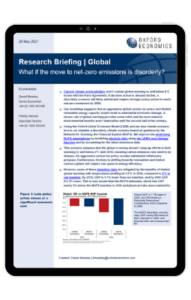What if the move to net-zero is disorderly?

Current climate action pledges won’t contain global warming to well below 2°C in line with the Paris Agreement. If decisive action is delayed further, a disorderly scenario will likely unfold and require stronger policy action to reach net-zero emissions by 2050.
Our modelling suggests that an aggressive global carbon tax policy and limited renewable energy capacity would result in substantial economic damage. A slower rate of global warming provides some relief, but the most material environmental benefits won’t materialise until the second half of the century.
Download this report to learn about:
- Late policy action comes at a significant economic cost
- Carbon tax pushes inflation higher, until a shift towards cheaper energy sources
- Recycling revenues mitigates the economic damage of transition in short term
Tags:
Related Services

Post
House prices continue to slide for China’s cities
Research Briefing What if the move to net-zero is disorderly? While the property market downturn has been universal, the scale and depth has been varied for different cities and regions.
Find Out More
Post
The Construction Productivity Challenge in Australia
Delve into the state of construction productivity in Australia. Understand the factors affecting growth and how innovation can transform the industry for the better.
Find Out More